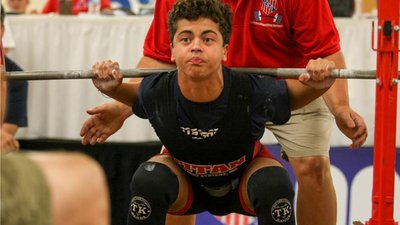Evan Pittman has accomplished a lot in life—and he's only 17. The Phoenix native is an acclaimed junior violinist, holds a black belt in taekwondo, and is a state springboard diving finalist. He's a member of Musicians on Call, which performs regularly for child cancer patients. He was awarded a 2016 President's Volunteer Service Award, and recently raised $3,500 for the Bob Woodruff Foundation to support wounded combat vets.

There's also this: Evan has set more than 100 records in the sport of powerlifting. Last November, the 5-foot-5, 148 pounder won the 17-19 teen and open class at the World Natural Powerlifting Federation Championship, setting records with 395 pounds in the squat, 235 in the bench press, and 485 in the deadlift, a total of 1,115 pounds.
Major Strength From A 75-Pound Frame
Evan's impressive run in powerlifting began when he was just 11, intent at the time on breaking into the winner's column at his local taekwondo club. He asked his dad, Hal, who had been lifting weights for almost four decades, what he should do to get stronger and faster. Hal had the answer.
"Dad got me started," says Evan. "Before I ever got around to lifting weights, I was doing a combination of pushing the [weighted] sled, throwing the medicine ball, doing push-ups and chin-ups, and doing them all super-fast."
Evan's transition to weights started out humbly, his dad guiding him through floor presses with 10-pound dumbbells. Before long, the senior Pittman had him working on the classic three powerlifting exercises: bench press, squat, and deadlift.
He remembers how his other young friends reacted when they found out he was lifting weights. "Kids started calling me Clark Kent because I was this scrawny little kid, but I was lifting all these big weights," says Evan.

Though new to powerlifting, with his dad's coaching to guide him, Evan soon set his first of many AAU World Championship records, deadlifting 194 pounds at 75 pounds body weight. He has entered just about every AAU Junior Olympic Games since, competing in powerlifting, feats of strength, springboard diving, and taekwondo, wining a total of 43 gold medals.
At the same time, his parents wanted to make sure Evan's still-developing body was helped, not harmed, by his lifting routine. All along, Pittman was very careful to teach his son the best form for each movement. But one day, when Evan told his parents he felt shoulder pain after the previous day's training, his mother put her foot down. "No more lifting," she announced.
"But then two days later, mom took me to a physical therapist, who told her it wasn't a powerlifting injury," recalls Evan. "It was from the way I was holding my violin."
Musical-instrument injuries notwithstanding, experts for years have debated the potential damage highly loaded resistance training might cause to the growth plates of bones among adolescents. The consensus among most experts is that young lifters are perfectly safe as long as they're taught proper form and follow reasonable programming. In fact, many experts now agree that weight training at an early age can have positive effects on youngsters, giving them both strength and coordination.
Evan's young career as a powerlifter has been remarkably injury-free. He strained his back while deadlifting at age 11, but after a month of rest, he was back to his workouts and taekwondo. With his father's guidance, he's been safe and getting stronger ever since.
A Powerlifting Evangelist Is Born
Despite his success, Evan doesn't go out of his way to encourage younger kids to start lifting. If they show an interest after about age 11, the first step is to find an adult willing to teach them proper form, he maintains. The reason, he says, is that even though there's a lot of information available online, it can be especially hard to distinguish good technique from bad when you're first starting out, and how to translate that over to your own efforts.
"A lot of the kids who want to get into lifting try to learn by watching YouTube videos," he says. "There are hundreds and hundreds of vids available for just about any movement. But how can anyone, let alone a kid, know which ones have good form? Whose tips should they pay attention to it? And is a particular lift even appropriate for them? It can be very hard to know."

Tapping into the expertise of an established training community is key to overcoming these hurdles. Evan suggests young people look for strength and speed conditioning gyms that specialize in training young people, or join a local lifting club. Still, he says most of the young people he sees at competitions have clearly been trained by individuals who don't seem to have much powerlifting training experience. With good form being such an important part of both getting strong and avoiding injury, he's convinced young people require hands-on training experience before trying to go off on their own.
Evan also acts as a mentor to young teens interested in powerlifting. He's captain of a youth lifting club, encouraging team members to follow their own passion wherever the iron takes them.
"I lift because I really love it, because I've made so many friends, and because competing has opened me up to so many new experiences. I try to pass that love on to anyone who'll listen," he says.
Limited Exercises, Big-Time Results
Today, Evan trains with weights four days a week: Sundays are for deadlifts, Tuesdays are for light presses, Wednesdays are for squats, and Saturdays are for benching. Before lifting, he warms up with 50 jumping jacks, box jumps, long jumps, and pull-ups.
On bench days, he does regular presses in addition to heavy partials using 3 and then 4 boards to shorten the range of motion. On deadlift day, he'll do his deadlifts, then follow up with paused squats, stopping at the bottom of the movement to release elastic energy. On one deadlift day per month, he will lift off six-inch blocks to shorten the range of movement so he can lift heavier weights.

On squat days, he follows his back squats with reverse band squats, which overload the top of the lift. Then he does deficit deadlifts, using about half his max deadlift of 500 pounds to work on the lower end of the range of motion. On light days, he does his bench presses or floor lifts for 45 minutes, then adds some other upper-body work, including chin-ups, pull-ups, and standing barbell presses.
Evan's gym is in his family's garage, which limits his exercise choices, but his routine is built around basic movements anyway. He follows no special diet; he eats what 17-year-olds eat.
"Working out with my dad really keeps me going," says Evan. "I really admire him. He gets up at 6 a.m. and doesn't get home until 7 or 8 at night. It doesn't leave much time for father-son bonding, so we spend as much time together in the garage as we can."
Teen Trailblazer
Next fall, Evan heads to college. He says weight training is such an integral part of his life that he knows he'll keep at it during college and beyond. But in spite of all the sport has given him—and all that he has given to the sport—he still sees room for improvement.

Evan says if he could change one aspect about his powerlifting, it would be to have more confidence in himself. "When I go to meets, sometimes I underestimate how much I can lift," he admits. "I might deadlift 500 pounds at home, but when I'm in competition, I tend to go for less. I need to have more confidence when it comes to performing onstage.
"I tell other kids who might be interested in weight training that you don't need access to a really fancy gym to be successful so long as you put in the effort. As with any sport, the odds of ever making it as a professional aren't great. But the training itself will give you the discipline and determination you need to succeed at whatever you do in life."

